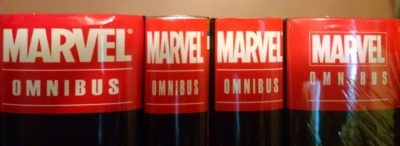 As we continue our trip backwards down Marvel Memory Lane, I’m here to convince you to read – or, at least, covet – 12 more Marvel runs, this time from 1998 to 2008.
As we continue our trip backwards down Marvel Memory Lane, I’m here to convince you to read – or, at least, covet – 12 more Marvel runs, this time from 1998 to 2008.
While my concurrent period of X-Men looked at 2001 to 2008, for the rest of the Marvel Universe 1998 was a better starting point. That’s because Marvel’s Avengers and Fantastic Four franchises relaunched new volumes in 1998, and Spider-Man and Daredevil were rebooted within the next year as well.
(That wound up being less relevant to this post than I planned, since I decided not to touch mapping Fantastic Four or Spider-Man in the style of my exhaustive X-Men mapping. I also won’t hit the titles that are just waiting for a sequel – namely Thor, Captain America, and Iron Man. See my Orphan Report for more on those. And, one of the best runs from this period – Christopher Priest’s Black Panther – is already in the survey results.)
I’ve read less of Marvel outside of X-Men, so I’m being a little choosier with these runs so I don’t lead you astray! That’s not only a choosiness in quality, but in self-containment. While Marvel’s Universe was a little more siloed from 1998 to 2005, once New Avengers arrived titles became increasingly intertwined and reliant on events to launch and intersect with them until we hit peak tie-in after Secret Invasion in 2008, with the entire Marvel Universe being affected by Dark Reign in one way or another.
These runs aren’t that – they’re comics you could sit down and enjoy today regardless of your foreknowledge about a certain plot or character. While some of them intersect event series, none of them rely on your reading the main event to enjoy their chapters.
If you want to see any of these runs released in all-in-one omnibus editions, perhaps you should include some of them on your Most-Wanted Marvel Omnibus Secret Ballot – votes are due this Sunday!
However, omnibuses are not your only hope! The majority of these runs are collected in hardcovers and trade paperbacks listed in Crushing Comics’s Guide to Collecting Marvel Comic Books, and the vast majority of the issues are available on Marvel Unlimited, a $10/month Netflix-for-Marvel-comics.
Of course, all potential collection mapping comes with a disclaimer: all of my suggestions are subjective and subject to improvement, or at least spirited debate. If you have a correction, alteration, or disagreement, there’s no need to be shy – I’d love to hear from you in the comments, below.
Let’s dig in!
![]()
Black Widow (1999 – 2011)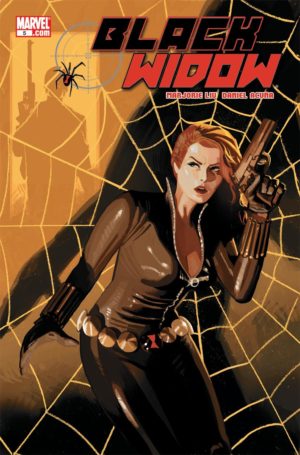
The Black Widow Omnibus (41 projected issues, with 9 possible additional issues)
Journey Into Mystery #517-521, Black Widow (1999) #1-3, Black Widow (2001) #1-3, Black Widow: Pale Little Spider (2002) #1-3 (stars Yelena, not Natasha), Marvel Knights Double-Shot #4, Black Widow (2004) #1-6, Black Widow 2 (2005) #1-6, Black Widow: Deadly Origin (2010) #1-6, Black Widow (2010) #1-8.(This could excerpt some story material from from Marvel Knights #1-15 and Marvel Knights, Vol. 2 #1-6, but likely not whole issues.)
Could also continue to Hawkeye & Mockingbird / Black Widow: Widowmaker #1-4 and Captain America and Black Widow (2012) #636-640. While it’s tempting to add Widow’s preceding 90s OGNs, they’re of a different period and would be better recollected with her Marvel Fanfare material.
What is it? Over a decade of easy-to-digest short runs of Black Widow.
Read it now: Guide to Black Widow
Black Widow has the peculiar distinction of living most of the 2000s through a series of mini- and limited-series before finally landing in a long-running ongoing series in 2014.
She could also be found starring in Iron Man and Captain America in this period, but even as she occasionally took over each of those titles she was still a supporting character – they weren’t about her development. If you want that, plus stories delving into Widow’s history with the Red Room, you need to start here.
Since all of these books are short runs, they didn’t assume too much foreknowledge or cross over with any other books or events! That makes this omnibus a short-story collection that’s super-friendly for both experienced and casual readers alike.
![]()
Captain Marvel (1999/2000 & 2004)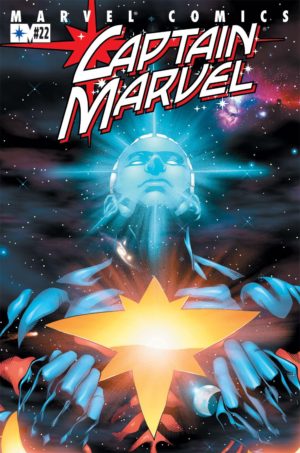
Captain Marvel, Vol. 1 (40 projected issues)
Collects Silver Surfer (1987) Annual 6 & #90 (plus the final page of #89), Secret Defenders (1993) #14, Cosmic Powers (1994) #4 (and pages from #6), Silver Surfer Annual 7 (2nd story), Captain Marvel (1995) #1-6, Avengers Unplugged #5, Silver Surfer #122, and Captain Marvel (2000) #0-26That breaks the first series after the ‘Nuff Said issues. We could probably also fit the final 9 issues of the series, but they can be broken into a following projected volume.
We could also include Silver Surfer (1987) #105-110 after Annual 7, but an entire Surfer arc feels like overkill. Same for Warlock #1-4 (1998) after Silver Surfer #122.
Captain Marvel, Vol. 2 (36 projected issues)
Collects Captain Marvel (2000) #27-35, Captain Marvel (2002) #1-25, and New Thunderbolts #18 & Thunderbolts #100
What is it? Second generation cosmic hero fails to live up to his legacy, but not for lack a trying.
Read it now: Guide to Captain Marvel
The son of the first Captain Marvel starts out literally named “Legacy,” but eventually takes up his father’s mantle to go along with his powers and costume. Unfortunately, he’s not a great match for cosmic power.
Let’s just say, he turns to the dark side.
Peter David is a reliable scripter and this run had a lot of fans at the time – Captain Marvel was voted fan favorite hero in Wizard mag, which seems sort of ludicrous in retrospect when you think about historic runs happening in other titles a the time. Without a single modern event to interrupt this run, it’s 60 unadulterated issues of development for a single character – something that’s really hard to come by today at Marvel.
Note that this is the one run that isn’t entirely readable on Marvel Unlimited – it’s missing #26-35 of the 1999/2000 series.
![]()
Daredevil (1998)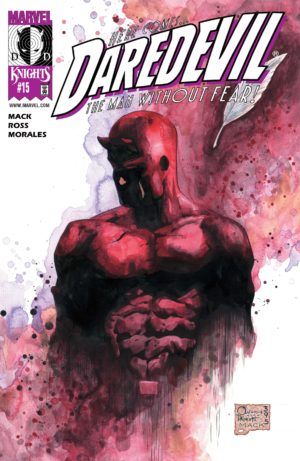
Daredevil: Parts of a Whole (47 projected issues)
Collects Daredevil (1998) #0 (digital preview), 1/2, 1-15, Daredevil/Spider-Man # 1-4, Daredevil: Ninja #1-3, and Daredevil (1998) #20-25, Spider-Man/Daredevil #1, Marvel Knights Double Shot #4 (2nd story) Daredevil (1998) #51-55, and Daredevil: Father #1-6
What is it? A companion piece to Bendis’s Daredevil filled with short, accessible stories.
Read it now: Guide to Daredevil
Alright, this one is less an amazing read and more wishful thinking on my part (and on the part of a lot of other fans).
Kevin Smith (yes, that one) relaunched Daredevil in 1998 with Daredevil #1-8. That run, and the following issues by David Mack, have been collected in oversize hardcover, but it’s been nearly a decade since it was available. Brian Bendis took over from there with #16-19 and returned for a length run from #20-81, with a break for #51-55.
That leaves us with just 26 issues around the historic Bendis run that haven’t been collected cohesively. Additionally, Daredevil had a few mini-series in this period which filled in some gaps in his story – one of which, Ninja – was written by Bendis himself!
So, this book isn’t exactly a perfect front to back read. However, it contains a number of shorter Daredevil stories instead of the mega-epic he was one for the entirety of the 2000s. Think of it more as a Daredevil by Brian Bendis Companion that gives you all of the rest of Daredevil’s action prior to the one-year gap in story that occurs at the top of #56.
![]()
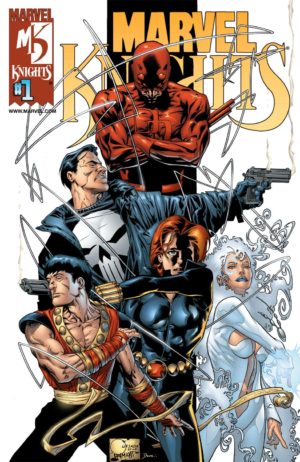 Marvel Knights (2000) & Marvel Knights (2002)
Marvel Knights (2000) & Marvel Knights (2002)
Marvel Knights Omnibus (25 projected issues)
Collects Marvel Knights (2000) #1-15, Marvel Knights (2002) #1-6, Marvel Knights Double Shot (2002) #1-4
What is it? A mature readers team-up of all of Marvel’s street-level (AKA Netflix-y) heroes.
Read it now: You’ll need Marvel Unlimited – these issues have never been collected!
The late 90s and early 00s were gaunt years for the comics industry that nearly saw Marvel disappear from the landscape. In retrospect, it freed them to make some interesting choices, and this series was one.
Marvel Knights was the flagship book of an in-continuity, mature readers line of Marvel books prior to the invention of Marvel MAX (which would eventually depart from continuity). The title starred a who’s who of Marvel’s street-level heroes, including Daredevil, Black Widow, Shang Chi, Punisher, Cloak & Dagger, and more.
Basically, it’s the perfect book to feel of a piece with Marvel’s current TV efforts, and it has never been collected. That’s just ridiculous! If you’re enjoying Marvel’s Netflix Universe or are excited by the new trailer for the Freeform Cloak & Dagger series, you should read this now.
![]()
Runaways (2003 & 2005)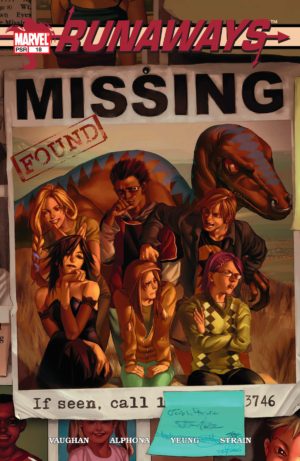
Runaways by Brian K. Vaughan (42 projected issues)
Collects Runaways (2003) #1-18 & Runways (2005) #1-24Runaways by Joss Whedon, Terry Moore, & Kathryn Immonen (30 projected issues)
Collects Runaways (2005) #25-30, and then collects The Loners (2007) #1-6, Secret Invasion: Runaways/Young Avengers #1-3, Runaways (2008) #1-14, What if the Runaways were the Young Avengers, and material from Uncanny X-Men: The Heroic Age
What is it? A group of super-powered teens strikes out on their own after learning a deadly secret.
Read it now: Guide to Runaways
Brian K. Vaughan might be the most-trusted author in all of comics, and this was his definitive act of creation at the Big Two. He dreamt up a group of misfit teen heroes thrust into each other’s lives and each determined to reject the legacy of their parents.
You need to know absolutely nothing about Marvel to start reading this series. Vaughan invents everything from whole cloth and gradually eases into connections with the wider Marvel Universe. Plus, as a modern invention, this team is actually diverse, both in its representation of ethnicity and sexuality.
This series has been printed in every imaginable configuration except for omnibus. A trio of oversized hardcovers collected this material through #24 of the 2005 series, but they’re increasingly hard to find and as expensive as an omnibus on their own. With Runaways coming to television soon, it’s time to finally get all of the Vaughan material all in one book.
Vaughan’s second series was completed by non other than Buffy creator Joss Whedon before a subsequent relaunch. While this back half of the material isn’t as acclaimed as the Vaughan run, it represents all there is of the Runaways story – since the end of their 2008 series they’ve only made a handful of appearances as a group – and several members have been distributed to other titles and teams.
![]()
Black Panther (2005)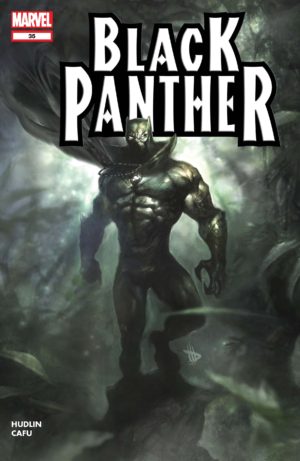
Black Panther by Hudlin & Aaron (44 projected issues, with 2-6 additional optional issues)
Collects Black Panther (2005) #1-41 & Annual 1, X-Men, Vol. 2 #175-176.To that you could add Cable & Deadpool #45-46 or X-Men: Worlds Apart #1-4
What is it? A run that starts out back to basics and then sews in Black Panther more closely than ever to the rest of the Marvel U.
Read it now: Guide to Black Panther
Christopher Priest’s extended 1998 run on Black Panther tends to get all of the love as a fantasy omnibus, but this Reginald Hudlin and Jason Aaron run packs a lot of narrative punch and includes significant and lasting developments for T’Challa.
It also starts with a stellar modern update of Black Panther’s origin, making it super-friendly to new readers.
Oh, plus he gets married to a hero you might have heard of before: Storm. In fact, we could fairly call this omnibus “Black Panther & Storm,” and you know there are fans out there who would leap at the chance to buy that.
Their courtship and marriage makes for a clever tie-in to Civil War without actually strongly tying in to the actual event, because Black Panther is apart from the decidedly American conflict.
![]()
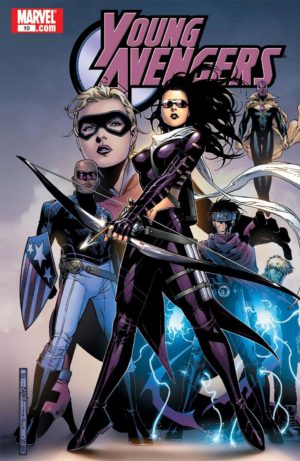 Young Avengers (2005)
Young Avengers (2005)
Young Avengers: Beginnings Omnibus (31 projected issues, with 11 optional additional issues)
Collects Young Avengers #1-12 & Special, Civil War: Young Avengers & Runaways #1-4, Secret Invasion: Runaways/Young Avengers #1-3, Young Avengers Presents #1-6, Dark Reign: Young Avengers #1-5, Siege: Young Avengers.To that you could add Avengers: The Children’s Crusade #1-9 with Uncanny X-Men #526 and Avengers: The Children’s Crusade – Young Avengers to bring this omnibus completely up to the point of the subsequent Young Avengers by Gillen & McKelvie omnibus.
What is it? Teens rip off the identities of all the movie Avengers, but they have their own problems to deal with.
Read it now: Guide to Young Avengers
Much like Brian K. Vaughan’s Runaways, Allen Heinberg invented a whole teen team of Avengers from whole cloth. The difference is that Vaughan purposely kept his heroes disconnected from the wider Marvel Universe, whereas Heinberg’s team are each a copy of a famous Avenger.
I am at a complete loss for how Marvel hasn’t capitalized on this material for an omnibus. Not only is it an utterly fantastic read, but the team is almost a 1:1 copy of the Avengers from the MCU – including Scarlet Witch, Quicksilver, and even Ant-Man!
Not only that, but the original 12-issue miniseries is an evergreen page turner full of teen angst, romance, time travel, and an assist from Captain America and Iron Man. Various filler series that kept the team alive vary in quality, but not a single one of them has been comprehensively collected – a pity, since the team has a single through-line from their debut to the blockbuster Children’s Crusade story that launched in 2010 to bring Scarlet Witch back to Marvel’s limelight.
![]()
Daughters of the Dragon (2006) & Heroes For Hire (2006 & 2011)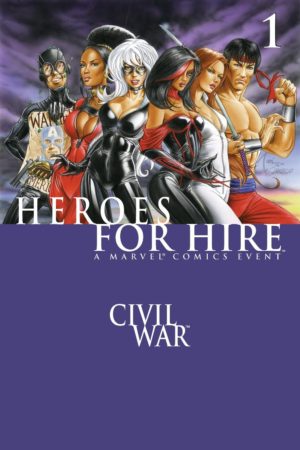
Misty Knight & The Heroes for Hire (45 projected issues)
Collects Marvel Premiere (1972) #19-20, The Deadly Hands of Kung Fu (1974) #32-33, Bizarre Adventures (1981) #25, Daughters of the Dragon (2006) #1-6, Heroes For Hire (2006) #1-15, Heroes For Hire (2011) #1-12, Spider-Island: Heroes for Hero #1, Villains For Hire (2012) #.01 & 1-4, plus Shang-Chi: Master of Kung Fu #1
What is it? Misty Knight heads up a Swiss Army Knife team of on-call heroes.
Read it now: I sadly don’t yet have a Misty Knight page, but you can pick this series up via Daughters of the Dragon, Civil War: Heroes for Hire, Heroes For Hire Vol. 2: Ahead of the Curve, Heroes For Hire Volume 3: World War Hulk, and Heroes for Hire by Abnett & Lanning: The Complete Collection
Before Luke Cage got cool again and Jessica Jones traded in her mom jeans, it was up to Misty Knight and Colleen Wing to carry the baton of Marvel’s NYC street level heroes in a fashion that feels a lot like what Marvel is assembling for their Netflix Defenders series.
Misty did so in style across this fantastic comic run that highlighted a number of obscure heroes – many of them women and non-white characters who wouldn’t typically carry their own title.
Seriously: this was one of those comics I read long after the fact and was shocked to discover it wasn’t a massive hit at the time. It’s major fun, full of great characterizations, shocking twists, and endless guest stars. If you dug Misty and Colleen in Luke Cage and Iron Fist, you really need to read these comics (and vote for them in the Secret Ballot!).
![]()
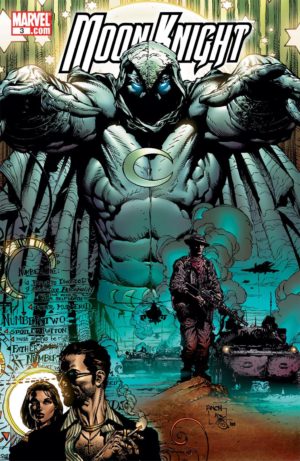 Moon Knight (2006) & Vengeance of the Moon Knight (2009)
Moon Knight (2006) & Vengeance of the Moon Knight (2009)
Moon Knight by Huston & Benson (32 projected issues)
Collects Moon Knight (2006) #1-30 & Annual 1, Moon Knight: Silent KnightMoon Knight by Hurwitz & Bendis (25 projected issues)
Collects Vengeance of the Moon Knight (2009) #1-10, Shadowland: Moon Knight #1-3, and Moon Knight (2011) #1-12
What is it? Moon Knight roars back from obscurity as Marvel’s ultra-damaged take on Batman.
Want to read it? Guide to Moon Knight
In the scope of fan-favorite Moon Knight runs it seems that the hyper-violent Charles Huston run from 2006 is destined to rank behind both Doug Moench’s original and the recent Ellis>Wood>Bunn>Lemire chain.
It will always be first in my heart for being a brilliant, brutal extension of the original Doug Moench themes updated for a modern comic sensibility. I’ve read every issue and I loved it.
This was a brilliant, brutal extension of Moon Knight’s existing themes, bringing his story to the present day complete with his original supporting cast. The opening art by Finch, born to be a Batman artist, is grimy and beautifully detailed.
Speaking of The Bat, it’s this run that really cemented for me that Moon Knight is a more grounded, cynical take on Batman. He’s half-insane, constantly switching between secret identities such that he’s not sure which one is really him. He’s so obsessed with meting out justice that he can’t stop himself from beating criminals to a bloody pulp or from getting beaten into one himself when he’s outmatched. And, it’s never entirely clear just how much supernatural power Moon Knight draws from the god Khonshu – or if he’s just a figment of Moon Knight’s imagination!
I’ve tried to force the subsequent Hurwitz & Bendis runs into matching up with the Huston material both in my head and in omnibus mapping, but its just not destined to be. Both authors watered down that level of insanity into something more average and street level. Both get in some strong issues – Bendis, in particular, thanks to Alex Maleev on art – but neither feels as quintessentially Moon Knight as the Huston run.
![]()
Ms. Marvel (2006)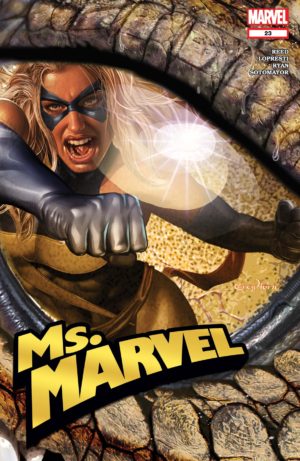
Ms. Marvel by Brian Reed
Collects Ms. Marvel (2006) #1-50, Giant-Sized Ms. Marvel, & Ms. Marvel: Storyteller
What is it? A vision of an alternate reality where she’s Earth’s greatest hero convinces Carol Danvers to finally make a go of it as a solo hero.
Read it now: Guide to Ms. Marvel
Ms. Marvel gets her own title for the first time in 30 years, and it starts out by standing up to the hype with big adventures, chapters of Civil War, and a long-awaited confrontation with Rogue.
If you had been a years-long fan of Carol Danvers, it’s everything you always hoped for from her ongoing title. And, if you haven’t, it’s a perfect crash course on her history and character flaws.
After this initial burst of story the title stumbles a little, getting overly-focused on fluctuating powers and Ms. Marvel fighting doubles of herself.
However, Reed turns what could be tiresome repetition into a theme. He has Carol confront every iteration of her heroism and deal with every possible failing and emerge as a confident hero. It’s not only much-needed character repair, but it perfectly sets up Ms. Marvel’s transition to Captain Marvel in 2011 as a character with a deep history but a relatively clean slate.
![]()
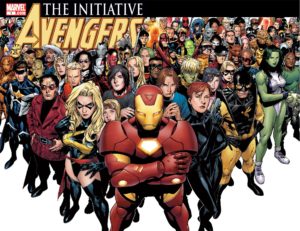
Avengers: The Initiative (2007)
Avengers: The Initiative by Dan Slott & Christos Gage
Avengers: The Initiative #1-35, Annual 1, and “Special – Featuring Reptil” one-shot.
What is it? After Civil War the government wants a team of registered superheroes in every state – so, who’s going to train over 200 heroes?
Read it now: Guide to Young Avengers
Dan Slott and Christos Gage are magic men – they never turn in a bad Marvel series, and this Avengers spin-off is no exception.
This title focuses on superhero training squads, but it’s not a school book like X-Men Academy or teen drama like Runaways or Young Avengers. The authors work with a slew of Marvel’s 90s castoffs (Rage, Slapstick), some new creations (Cloud 9, Hardball), and experienced instructors (Tigra, Taskmaster) to create a fully realized little pocket of the Avengers universe, whose internal politics are just as interesting as their run-ins with events like Secret Invasion and Dark Reign.
The Initiative campus is packed with intrigue, and you’ll find yourself wishing for more of many of the characters as they are quickly shuffled in and out of the story.
![]()
The Incredible Hercules (2007)
The Incredible Hercules by Pak & Van Lente (53 projected issues)
Incredible Hulk (1999) #112, Incredible Hercules (2008) #113-115, Hulk vs. Hercules: When Titans Collide, #116-131, Deadpool Team-Up Vol. 2 (2010) #899, #132-137, Assault on New Olympus Prologue, #138-141, Hercules: Fall of an Avenger (2010) #1-2, Heroic Age: The New Prince of Power #1-4, Chaos War #1-5, Chaos War: Chaos King (2011) #1, Chaos War: God Squad (2011) #1, Chaos War: Ares (2011) #1, & Herc #1-6.This omits a run-up in Incredibly Hulk #106-111, which is part of World War Hulk and will be collected in that omnibus. The issues feature Hercules, but aren’t necessary to understand his run.
It also strands 8 Chaos War issues that don’t feature Hercules (plus 3 Hulk tie-in issues), but they’re not especially relevant to this omnibus: Chaos War: Alpha Flight (2011) #1, Chaos War: Dead Avengers (2011) #1-3, Chaos War: Thor (2011) #1-2, Chaos War: X-Men (2011) #1-2, and Incredible Hulks (2010) #618-620
What is it? Marvel’s version of the demi-God has his first solo ongoing that highlights the many gods of the Marvel universe.
Read it now: Guide to Hercules
I’ll level with you – I’ve never read a single issue of this Hercules run, despite owning it all in trade paperbacks. I’m recommending this to you on the strength of the utter amount of rabid fan fervor the run created while it was ongoing.
Marvel does this sort of thing a lot – replaces one character (Hulk) with another in their own run (Hercules) in an attempt to give an untested hero some extra sales momentum. The move almost universally fails, but in this one instance it was a big success.
That’s not necessarily because Hercules is so very cool (sorry, Herc), but because of Greg Pak and Fred Van Lente. Pak has a golden touch – the ability to imbue C-list heroes with depth and sincerity. Van Lente is effortlessly funny, not in a gag-a-minute Deadpool way, but as something that feels more like a superhero family sitcom from the late 80s.
Together they were perfect for Herc, equal parts hero, vainglorious romantic, and spectacular drunkard. Part of that was pairing him with a counterpart, Pak’s Amadeus Cho – a young Korean super-genius with a plan to save the world that involves Hercules in a major way.
For a while, that made Herc the unlikely hero who could thanks to his newfound fanbase. This run stretched beyond the life of its central ongoing series, getting resurrected in a pair of mini-series, a poorly-received mini-event, and a briefly relaunched ongoing before finally petering out just before Avengers vs. X-Men.
Hudlin Black Panther has a few other possibilities. There is the four issue miniseries Black Panther/Captain America: Flags of Our Fathers that Hudlin wrote delving more into the past of the BP legacy. There is also Eric Jerome Dickey’s six issue Storm miniseries that did the footwork on retconning so that Hudlin could attempt to sell their marriage. Hudlin then wrote Black Panther Vol 5 1-6 starring Shuri before handing it off to Jonathan Maberry to continue T’Challa and Shuri’s adventures. A recent Doomwar reprint included BP Vol 5 7-12, Doomwar 1-6, Klaws of the BP 1-4. The Deadliest of the Species trade collecting Hudlin’s stuff is near impossible to track down. At I believe 67 issues (including Worlds Apart but not Cable/DP), that’s way too big for an omnibus. Who knows. I’ve been tracking down the entire 2005-2012 Black Panther saga recently, so it’s on my mind. Some of those trades are a pain to find.
Oo, those are all great points! I knew Hudlin wrote some of that follow-up series with Maberry, but not about Flags of Our Fathers.
Do you think it would be worth it to interrupt the Hudlin run mid-omnibus to insert Flags or Storm’s mini, or would they be back matter? And, should the volume be Hudlin-only and skip out before Aaron’s piece?
As for the Doomwar et al, I always viewed that as a follow-up omnibus – but, I haven’t read the end of the Hudlin/Aaron run, so I don’t know if it flows right into that or not.